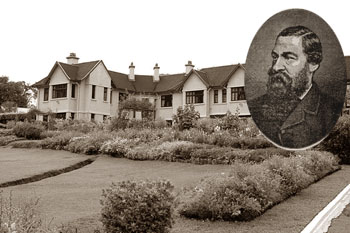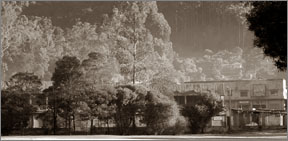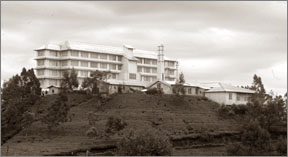|
observer |
|
|
|
|
|
OTHER LINKS |

|

|

|
'They don't make them like that anymore'The phrase might have been coined with Sir Samuel White Baker in mind
Samuel Baker led a quite extraordinary life even for a 19th century explorer. His life was so rich with incident and adventure that it is hard to do justice to it. He was a man of so many parts - a pioneer of agriculture here in Nuwara Eliya, a hunter everywhere he went, an explorer in Ceylon and in Africa, a writer mainly about his own adventures, an imperialist, an administrator in the Sudan, a builder of railways, and a travelling companion to the Prince of Wales. He also became a Major-General in the Ottoman army and was sent on an expedition to equatorial East Africa to wipe out slavery. Yet he had himself bought the woman he later married, as his second wife, at a slave auction. To have done so much in one lifetime suggests Samuel Baker had enormous energy and more than his fair share of luck. He seems positively to have enjoyed courting danger and lived constantly on the edge. But against all the odds, he died in retirement in England at the ripe old age of 72. Samuel Baker was born in London in 1821. His father made a forlorn effort to persuade him to enter the family business, trade with the Caribbean, but he was wholly unsuited to office life.
A visit to Mauritius seems to have whetted his appetite for travel and adventure and in 1846 he came to Ceylon with his young wife. He was just 24 years old. Baker did not intend to stay long, just a year in which time he intended to hunt as many large animals as he could. Indeed, it was the tales he had heard about the narrow escapes of elephant hunters that initially drew his adventurous spirit to this island. So he set off into the jungle and did indeed enjoy himself to the full, shooting pretty much anything large that moved. But by the end of it he was suffering badly from jungle fever and his doctor told him to go to the sanatorium at Nuwara Eliya. Here Samuel Baker recovered. Within two weeks he was back on his feet and he fell in love with the natural beauty, the climate and potential of Nuwara Eliya. At the time, Nuwara Eliya was suffering from neglect. Baker wrote that: "The rest-house or inn was the perfection of everything that was dirty and uncomfortable." Baker praised Governor Barnes for building the road that led to Nuwara Eliya and for erecting the only substantial building and the sanatorium here, apparently at his own expense. Later governors, however, had not shown much interest in the place. Baker thought this official neglect of Nuwara Eliya short-sighted. As he later wrote in his book 'Eight years wanderings in Ceylon' Why should this place lie idle? Why should this great tract of country in such a lovely climate be untenanted and uncultivated? His year's stay in Ceylon and his recovery from jungle fever being completed. Baker returned to England. But the magic of Ceylon and Nuwara Eliya in particular had cast a spell on him. Before long, he was planning his return, this time principally as a settler. Aided by his brother. Samuel Baker came back to Nuwara Eliya bringing emigrants from England, together with choice breeds of cattle and sheep and the latest agricultural equipment. Things did not, however, start well. His groom managed to ride his tame elephant to death and, while drunk, drove his carriage with its horses over a cliff. Many of the best cattle died. The soil, which had looked so fertile at first sight, turned out not to be. The first crops were devoured by wild animals as soon as they appeared. The wife of one of the English settlers died. The biggest disappointment was perhaps the need to find manure for the soil, which meant scaling back his plans to clear the jungle and breed cattle. Even the pasture for the cattle needed manure. But Samuel Baker had expected misfortunes. And he did not let these serious setbacks dent his vision and ambition. Through sheer hard work, dogged persistence, and resolution in the face of adversity Baker and his fellow settlers began to turn things around. And within a few years, Nuwara Eliya was thriving. Samuel Baker wrote two books about his time in Ceylon. I have mentioned 'Eight Years' Wanderings in Ceylon which describes his founding of the agricultural settlement here. His other book. The Rifle and the Hound in Ceylon, sets out his love of hunting and the adventures he had tracking down and killing wild animals. Samuel Baker's enthusiasm for hunting and killing wild animals strikes the modern reader as pretty barbaric. It is not a side of Baker's character that has survived the years well. Attitudes towards wildlife have changed greatly for the better since the middle of the 19th century. Despite that, Samuel Baker's bravery in the pursuit of his favourite sport is astonishing. He stares down a wounded and angry buffalo, at a distance of a few feet. He stands and shoots at wild elephants in the thick jungle unable to see them clearly but vividly aware that they are charging at him. He paddles out in a small canoe after large crocodiles. He kills wild boar with a dagger. The amazing thing is that he survives all these close encounters with wild animals and lives to tell the tale. And he tells a rollickingly good tale too. 'The rifle and hound in Ceylon' is a cracking read once you get over the distaste of so many wild animals falling prey to Baker's love of what he calls sport. Here's an extract, just to give you a flavour. Samuel Baker has been tracking a herd of buffalo. 'We were within about ninety paces of them when suddenly the whole herd of about two hundred buffaloes, headed by two large bulls, dashed straight towards us at full gallop. On they flew and were within thirty paces of us when I took a steady shot with the four-ounce and the leading bull plunged head-foremost in the turf.. Snatching the two-ounce from the petrified gun bearer, I had just time for a shot as the second bull was within fifteen paces, and at the flash of the rifle, his horns ploughed up the turf and he lay almost at our feet. That lucky shot turned the whole herd. When certain destruction threatened us, they suddenly wheeled to their left when within twenty paces of the guns and left us astonished victors of the field...." It's breathless. Boys Own stuff. I don't know about you but I feel the greatest sympathy, in this story, for the poor old gun bearer whom Samuel Baker prevents from running away. (Speech given by Dominic Chilcott, the British High Commisisoner at the opening of Sir Samuel W. Baker Exhibition organised by John Knox International School in Nuwara Eliya, recently) |













